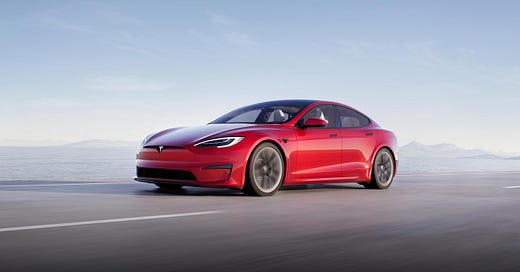It amazes me how many people still underestimate the electric vehicle revolution.
The chip shortage means there’s not much product in 2021. The Trump counter-revolution is tamping down demand. Millions drive their gas guzzlers like oil was King. They sit at drive-throughs rather than get vaccinated. They go racing in the streets. A 16 year old ran over 6 cyclists in Texas while rolling coal.
That won’t stop change. The irony is that self-driving isn’t even the revolution.
Electric motors are simple to make, just two parts. They can be made in any size. A generator is just an electric motor running in reverse, turning mechanical power (as from a windmill) into electricity. You can make an electric motor small enough to run a watch. They’re also nearly twice as efficient as motors using fossil fuel.
Gasoline dominated for a century because gas was cheap, and utilities weren’t scaled. But mass transit has been electric for over a century. Grand Central Station was built for electric trains. Banning steam let the Vanderbilts cover miles of track and create Park Avenue.
Flexibility is the key to the coming change. Since motors can be small enough to run bicycles, bike paths must adapt to faster traffic. Cities are being redesigned around bike traffic, but speed limits must follow.
Most cars run for just an hour each day. They need regular maintenance. They break down a lot. Electric cars can run all day and night. Their maintenance needs are minimal and can be managed with technology.
Most people associate electric cars with autonomy, but that’s just one potential feature. Even semi-autonomy can keep delivery drivers on their routes. I’ve long felt it’s the solution to drunk driving. Just alert other cars with a rotating light. Ambulance drivers become medical assistants and services, not drivers, will take us elderly to our doctor appointments. (Electric scooters are already dirt cheap. Electric bikes soon will be, too.)
Because electric motors are quiet and don’t pollute, we can live closer together. Rental scooters and bikes can become the norm, especially as millions buy them for short trips. Commutes become more efficient with technology creating ad-hoc rideshares. It will feel wasteful to “buy” a car just for long-distance trips. The rental business will come back.
Along the way millions of jobs are going to disappear. Once society is supplied with electrics, demand for them is going to decrease. They will become more utilitarian. Dealers and car mechanics are going away. I personally think trains for moving people will become obsolete, except as tourist attractions. The MARTA system by my house will become an electric toll road.
Full autonomy will eventually eliminate jobs built around driving, both short-haul and long-haul. But that’s not going to happen right away. First go electric, then go autonomous. Don’t let Elon Musk fool you.
There’s a lot of bad news here for Tesla, which sees cars as expensive products people own and scale to meet defined needs. Shopping trips are already starting to go away. What’s left is driving for pleasure, and that’s not as big a market as Elon Musk seems to think. In 2030 auto transport will be a smaller, and very different, business than it is today. The car below is not the future.





